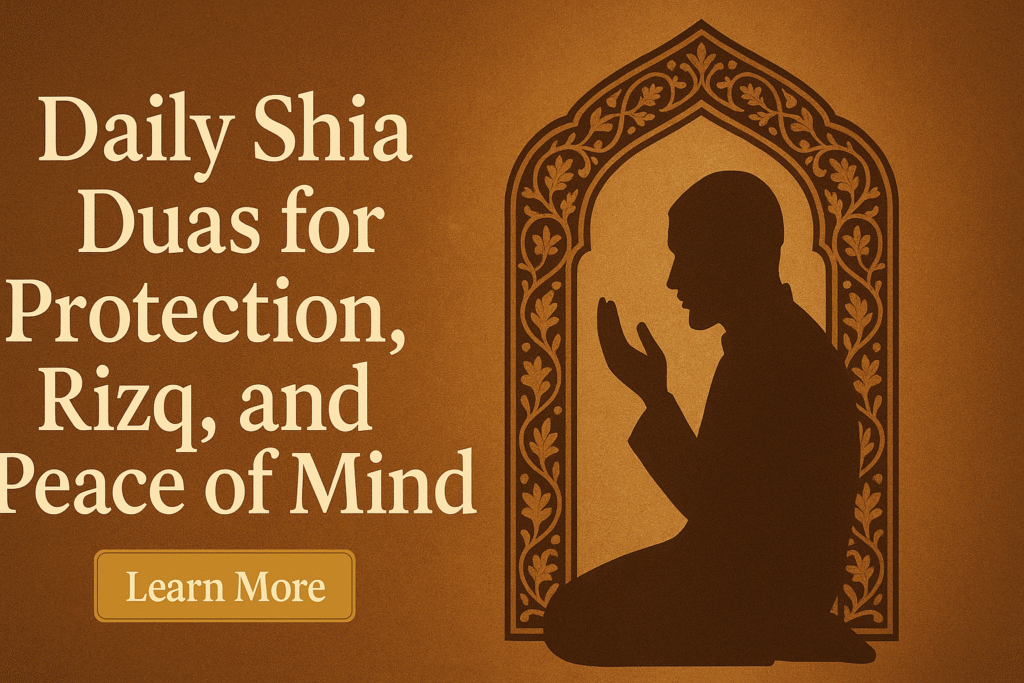Introduction
In a world where uncertainty often clouds our hearts and minds, the daily recitation of duas (supplications) brings light, peace, and spiritual strength. For centuries, Shia Muslims have turned to heartfelt duas for protection from harm, sustenance (rizq), and tranquility in their lives. These sacred invocations, passed down through the teachings of the Ahlul Bayt (A.S.), offer a powerful connection to Allah (SWT), transforming daily life into an ongoing act of worship and trust.
In this article, we explore the spiritual roots and practical benefits of daily Shia duas. From historical insights to timeless prayers, real-life stories, and modern-day relevance, this comprehensive guide is a must-read for anyone seeking a deeper connection with divine mercy. Whether you’re reciting Duas for protection, barakah in rizq, or peace of mind, these invocations can anchor your soul in faith.
Focus Keywords: Shia duas for protection, rizq duas, peace of mind Islamic prayers
Table of Contents
- Historical Background
- Spiritual or Religious Significance
- Real-Life Stories or Incidents
- Duas, Quotes, or Ziyarats
- Modern-Day Relevance
- Conclusion
Historical Background
The tradition of daily duas in Shia Islam has deep roots in the lives of the Prophet Muhammad (PBUH) and his Ahlul Bayt (A.S.). From the moment the Prophet received divine revelation, he taught the importance of supplicating to Allah in both joy and hardship.
Imam Ali ibn Abi Talib (A.S.) is famously known for his eloquent supplications, many of which are preserved in Nahjul Balagha. His son, Imam Zain ul-Abideen (A.S.), compiled the monumental Sahifa Sajjadiya — a book often referred to as the “Psalms of Islam” — containing 54 profound duas that remain central to Shia worship today.
These supplications were not just recited in private; they were taught to followers, shared in sermons, and woven into the fabric of early Shia communities. They helped shape a devotional culture that emphasized inner peace, ethical conduct, and reliance on divine help.
Spiritual or Religious Significance
The Quran itself commands believers to pray:
“Call upon Me; I will respond to you.” (Qur’an 40:60)
Duas hold an essential place in Islamic spirituality. For Shia Muslims, they offer a unique pathway to God through the intercession and teachings of the Imams (A.S.), who exemplified both perfect submission and deep personal devotion.
Protection
Daily duas for protection are often derived from the words of the Imams. For instance, Dua Al-Mu’awwidhat (Surahs Al-Falaq and An-Naas) is commonly recited for spiritual protection, as well as the famous Dua Al-Hizb Al-Bahr, attributed to Imam Ali (A.S.), asking for safety from enemies and calamities.
Rizq (Sustenance)
Imam Ja’far al-Sadiq (A.S.) narrated many supplications for increasing sustenance. One of the most widely recommended is Dua for Rizq from Sahifa Sajjadiya — a beautiful reminder that sustenance is not only material but also spiritual.
Peace of Mind
Modern anxieties can be overwhelming, but Shia duas offer calmness. Dua Al-Faraj, asking Allah to hasten the reappearance of Imam Mahdi (A.S.), brings hope, while Dua Al-Yastaheer provides comfort in times of confusion.
Renowned scholars like Allama Tabatabai and Ayatollah Behjat emphasized regular recitation of duas as essential to maintaining spiritual well-being.
Real-Life Stories or Incidents
The Dream of Protection
A woman in Lebanon reported that during a time of intense anxiety and fear of black magic, she began reciting Dua Al-Mu’awwidhat and Ayat al-Kursi after every prayer. Within weeks, her sense of fear vanished, and her home felt spiritually lighter. She later shared her story at a local Islamic gathering, inspiring others.
Rizq from the Unseen
A struggling father in Karachi consistently recited Dua Al-Sabah (attributed to Imam Ali A.S.). After months of unemployment, he received an unexpected job offer abroad — a result he credited to the barakah of consistent dua and tawakkul (trust in Allah).
Peace Amid Chaos
A university student in Canada, overwhelmed by exams and depression, started listening to Dua Kumayl every Thursday night. The power of the words brought tears to her eyes and slowly helped her regain emotional balance.
These stories reflect the deep impact that daily Shia duas can have in different walks of life, across the globe.
Duas, Quotes, or Ziyarats
Here are some essential daily Shia duas with translation:
1. Dua for Protection
Arabic: اللّهُمَّ اجْعَلْني مِنْ أَحْسَنِ عَبيدِكَ نَصيباً عِنْدَكَ، وَأَقْرَبِهِمْ مَنْزِلَةً مِنْكَ، وَأَخَصِّهِمْ زُلْفى لَدَيْكَ.
English: O Allah, make me among Your most rewarded servants, the closest to You in position, and the nearest in proximity.
Roman Urdu: Allahumma aj‘alni min ahsani ‘ibadika naseeban ‘indaka, wa aqrabahum manzilatan minka.
Source: Dua Al-Sabah
2. Dua for Rizq
Arabic: اللَّهُمَّ ارْزُقْنِي مِنْ حَيْثُ لاَ أَحْتَسِبُ
English: O Allah, provide for me from where I do not expect.
Roman Urdu: Allahumma urzuqni min haythu la ahtasib.
Source: Imam Ja’far al-Sadiq (A.S.)
3. Dua for Peace of Mind
Arabic: يَا أَرْحَمَ الرَّاحِمِينَ أَجِرْنِي، وَفَرِّجْ هَمِّي، وَاكْشِفْ كُرْبَتِي، وَيَسِّرْ أَمْرِي.
English: O Most Merciful, rescue me, relieve my anxiety, remove my distress, and ease my affairs.
Roman Urdu: Ya Arhamar Rahimeen, ajirni, wa farrij hammi, wa ikshif kurbati, wa yassir amri.
Source: Sahifa Sajjadiya
Modern-Day Relevance
In today’s fast-paced and often chaotic world, daily Shia duas offer an oasis of calm and a reminder of our divine connection. Many Muslims around the world, from Canada to Iraq, incorporate these invocations into their daily lives — on their way to work, before sleep, during prayer, or even via mobile apps.
Practical Tips:
- Create a daily dua routine (e.g., morning: protection, noon: rizq, night: peace)
- Use verified apps like Duas.org for accurate texts
- Recite aloud when safe and comfortable, or internally when in public
Emphasizing sincerity and consistency is key. It is better to recite one dua with deep concentration than to recite many mindlessly.
Conclusion
The power of daily Shia duas lies not just in the words, but in the heart behind them. As taught by the Imams of Ahlul Bayt (A.S.), sincere supplication can shield us from harm, open doors of sustenance, and grant peace even in the stormiest times.
These invocations connect us with centuries of tradition, divine mercy, and communal strength. Whether you’re a lifelong reciter or just beginning your journey, the world of Shia duas awaits — a timeless treasure to nourish your soul.
Also read:
FAQ
Q: What are the best Shia duas for protection?
A: Duas like Surah Falaq, Surah Naas, Dua Al-Sabah, and Ayat al-Kursi are among the most effective for protection, widely recommended by scholars.
Q: Is there a special dua for rizq in Shia Islam?
A: Yes, many are narrated from Imam Ja’far al-Sadiq (A.S.) and found in Sahifa Sajjadiya. Simple and heartfelt recitations like “Allahumma urzuqni min haythu la ahtasib” are very common.
Q: Can I read these duas in Roman Urdu?
A: Absolutely. Roman Urdu is widely used by Shia Muslims globally. The key is sincerity and understanding, regardless of language.

